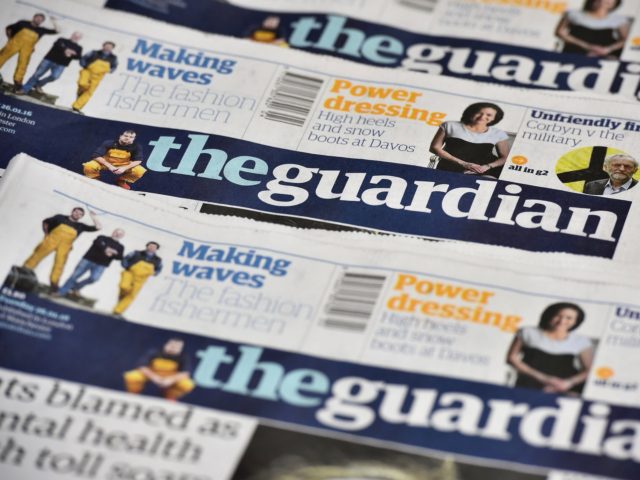Britain’s leading left-wing newspaper The Guardian has published a list of Conservative MPs and prominent personalities who joined the social media platform Parler, which the newspaper claims is favoured by the “far-right” and “Trump supporters”.
The Observer — the Sunday edition of Britain’s Guardian newspaper — claimed that at least 14 Conservative MPs had joined Parler before it was disappeared off the internet, after being removed from Apple and Google Play app stores, and Amazon Web Services ultimately pulling the company’s access to their internet servers. The social media network has since insisted it will “be back soon”.
The article named cabinet minister Michael Gove, Foreign Office minister James Cleverly, health minister Nadine Dorries, and Tory MPs Steve Baker, Ben Bradley, and Mark Jenkinson for joining Parler.
The Guardian said that Conservative MP Ben Bradley — who rose to national attention following his refusal to take so-called ‘unconscious bias training‘ in the Parliament — was the most “prolific Tory MP on the site”, claiming that he posted 52 messages to over 12,000 followers.
Responding to the article, Mr Bradley told Breitbart London: “Parler is just a platform, the same as Twitter, Facebook, TikTok, Instagram. The very nature of platforms is that they are a channel for the views of other third parties. They don’t have a ‘stance’ themselves. So ‘far-right platform’ is a total oxymoron. It’s nonsense.”
“There may well be some idiots on Parler with unsavoury views, just as there are idiots on Twitter, but you don’t hear anyone ask ‘are you on the far left platform Twitter?'”
“It’s a classic case of the left concocting some faux outrage to feed the online trolls,” Bradley concluded.
Parler is hitting back at Amazon with a lawsuit after the tech giant booted the social media platform off its web hosting service on Sunday. https://t.co/wynLWsvFLW
— Breitbart News (@BreitbartNews) January 12, 2021
Despite linking the Conservative MPs to the far-right, the article admitted: “There is no evidence any Conservative MP posted anything untoward or what might be considered extremist or far-right. Some of the accounts had been hardly used, and some of those activated in June 2020 appear to have been set up only to support the free speech protest.”
Yet, The Guardian did go on to cite analysts from the London-based Institute for Strategic Dialogue (ISD), who claimed that Parler served as a platform in which “the ideas of mainstream Conservative MPs coalesced with those of extremists”.
A senior policy manager at ISD, Milo Comerford, told the paper: “By positioning themselves as a safe haven for free speech and an alternative to the alleged ‘liberal bias’ of social media giants such as Facebook and Twitter, platforms like Parler attracted a motley crew of ultra-libertarians, violent extremists and conspiracy theorists, as well as more mainstream ‘free speech fundamentalists.’”
Former Brexit youth campaigner turned political commentator, Darren Grimes, who was also listed in the article, said: “I wonder which one they’re saying that I am? Certainly not a libertarian. Violent? No. Conspiracy theorist? I don’t think so. Free speech fundamentalist? Well, I think most in this country quite like the freedom to speak without fear.
“It’s an odd position for a newspaper to take.”
The Guardian on Free Speech: ‘Some Debates Should Be Shut Down’ https://t.co/nI45zD6tis
— Breitbart London (@BreitbartLondon) June 25, 2019
The article from The Guardian comes amidst increasing calls for censorship in America following the unrest at the Capitol building on January 6th. Following the events at the Capitol, Big Tech companies in Silicon Valley blacklisted or banned President Donald Trump from their platforms.
Left-wing media figures have also called for supporters of the President to be sent to “re-education camps” and to be “deprogrammed“.
In Britain, there have been growing attempts by the left-wing media establishment to tie Prime Minister Boris Johnson to President Trump — despite the British leader being far more globalist oriented than Trump.
Mr Johnson has “unreservedly condemned” President Trump for allegedly “encouraging people to behave in the disgraceful way they did”. Unlike other world leaders, Johnson has yet to take a firm stand on the actions by the tech giants censoring the sitting President of the United States.
Brexit leader Nigel Farage questioned last week: “If Macron and Merkel are both worried about Trump being banned from Twitter, where does Boris Johnson stand?”
Bojo calls Biden to plot 'Build Back Better', Green Agenda https://t.co/CVbm50ruLu
— Breitbart London (@BreitbartLondon) November 10, 2020
Follow Kurt Zindulka on Twitter here @KurtZindulka

COMMENTS
Please let us know if you're having issues with commenting.